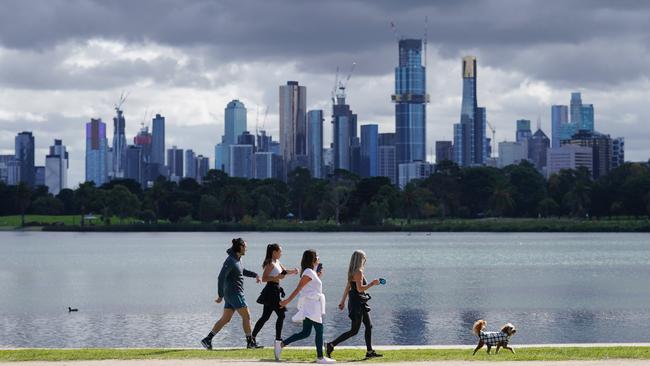ABS survey reveals Australians adapting to COVID-19 restrictions as job market takes a hit
A new ABS survey has revealed an astronomical number of Aussies have obeyed social distancing restrictions — ensuring the country is well on its way to flattening the COVID-19 infection curve.

VIC News
Don't miss out on the headlines from VIC News. Followed categories will be added to My News.
Australians have embraced social distancing with almost all — 98 per cent — saying they have changed the way they interact with others, an Australian Bureau of Statistics household survey says.
The survey found nine in 10 were avoiding public spaces and gatherings, while one in seven of the 1000 households surveyed reported self-isolating and taking further steps, including wearing a face mask as a precaution.
The survey was carried out by the ABS in the first week of this month.
It is the first survey in a new series designed to provide an overview of how households are responding to the changing social and economic environment caused by the COVID-19 pandemic.
While it highlighted people’s commitment to flattening the infection curve, the survey also revealed the economic hit the crisis was having.
Just under a quarter of people said they were working fewer hours a week — a further breakdown of that cohort showed 60 per cent were working less because of a reduction of hours offered and 15 per cent said they had been stood down by their employer.
“The survey found that around 3 per cent of people who had a job in early March no longer had one by early April,” Michelle Marquardt, ABS program manager for household surveys, said.
Sixty-three per cent of surveyed households had a job — but the ABS said the survey was not comparable to the official workforce measure.

In a sign the crisis was affecting businesses in different ways, 12 per cent of people said they were actually working longer hours than they had a month earlier.
At the time of the survey, the household economic stimulus payments were in the process of being distributed and information was not collected on how they were used, the ABS said.
The travel industry has been ravaged — and the survey illustrated how.
Some 52 per cent reported having to change or cancel travel plans during March because of the coronavirus crisis. Just over a quarter of those plans were for international travel.
While COVID-19 has proven to be more deadly in men than women, the survey indicated males are worried about it less than females.
Just 62 per cent of men reported being “concerned” or “very concerned” for their personal health compared with 73 per cent of women.
When broken down by age, 67 per cent of people aged 18-64 were concerned or very concerned, and 71 per cent of over-65s were concerned or very concerned.
But the vast majority had made changes to their personal hygiene. Almost 90 per cent reported washing their hands and/or using sanitiser more than usual in the past four weeks, while 13 per cent reported washing their hands and/or using sanitiser about the same as usual. The results were similar for men and women.
Meanwhile, Westpac’s monthly consumer sentiment survey showed a huge collapse in household confidence in April, the level plunging almost as low as past recessions.
The size of the collapse was the biggest in almost 50 years.
The federal government has poured billions of dollars into a wage subsidy program to try and cushion the blow of the COVID-19 lockdown.
But the Treasury expects the unemployment rate will reach 10 per cent in coming months.
WHAT THE SURVEY SAID …
■ 68% of people were concerned or very concerned about their personal health due to the spread of COVID-19.
■ 98% of Australians admitted to social distancing.
■ 63% over the age of 18 had a job at the start of April — a fall from 66%.
■ 1 in 4 people (26%) who had a job in the first week of April worked fewer hours than usual in the previous week, while 12% worked more hours than usual.
■ Over half of Aussies (57%), have cancelled or delayed travel plans
MORE NEWS:
CORONAVIRUS LANDS ROBERTA WILLIAMS LOOSENED BAIL
MARVEL STADIUM’S $225M REVAMP STILL ON CARDS

